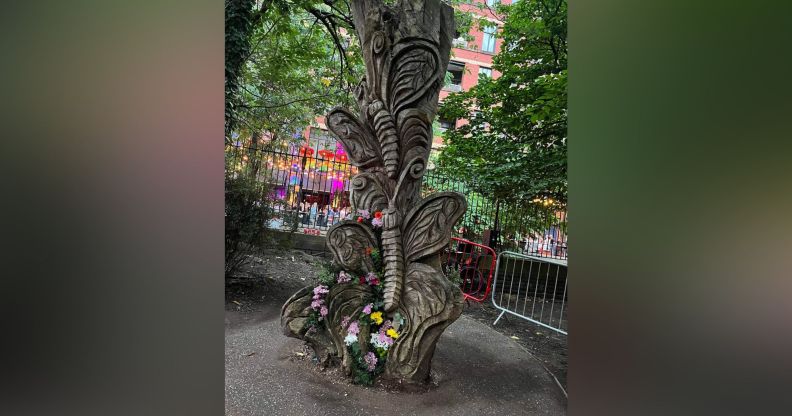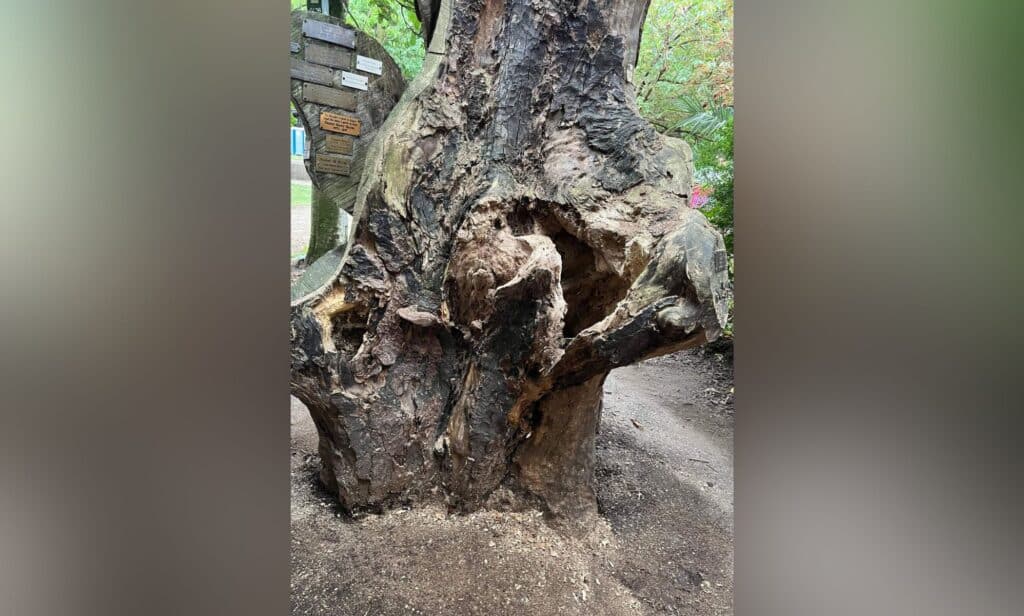Campaign to rebuild UK trans memorial after devastating fire shows trans people ‘will always be here’

The National Trans Memorial remembers the lives of victims of transphobic hate crimes. (Sparkle)
A campaign to replace the UK’s first National Trans Memorial, which was severely damaged in an arson attack, is showing the indomitable and “resilient” spirit of the trans community.
The memorial, which honours the victims of transphobic hate crimes, was “irreparably damaged” after it was set on fire during Manchester Pride weekend in August.
There were also reports the memorial was used as a urinal by Pride-goers throughout the weekend as they passed through the city’s Sackville Gardens.
Following the incident, Sparkle, who are custodians of the memorial, said it was apparent the organisers of Manchester Pride failed to take the necessary steps to protect the memorial from damage or brief security teams on its significance. PinkNews has contacted Manchester Pride for comment.
Vicki Mulligan, chair of Sparkle’s board of trustees, shared in “everyone’s anger and distress at the ignorance and indifference shown towards a powerful symbol” of the trans community’s “struggle”.

The National Trans Memorial was badly damaged by the fire and is “structurally unsound” as a result. (Sparkle)
Trans Tech Tent, a collective of tech enthusiasts in south Wales, has partnered with Sparkle to raise vitally needed funds to rebuild to memorial through a charity competition event, Phoenix CTF, over 22-23 October. The beginner-friendly event will have a virtual scavenger hunt and other contests for participants to learn skills as well as meet new friends.
The community and allies can also donate directly towards the National Trans Memorial rebuild through a GoFundMe campaign if they can’t make it to the Phoenix CTF, or just want to give a bit extra to the cause.
Abby Simmons, who works with Trans Tech Tent, said the National Trans Memorial was the “only permanent thing” the community had to “remember anyone by”.
“Having something basically in the centre of the country-ish – give or take – that everyone can rally around and be like, ‘My friend might have been buried with the wrong name, but I can remember them here where I don’t have to look at that and I don’t have to remember a life they didn’t actually live’ is quite reassuring,” Abby told PinkNews.
Hello there!
We're a @TransTechTent event and we'd love for you to take part in a day or so of hacking, learning, and scavenger hunting!
Check out our site for more:https://t.co/LMJzJVpAdg
All proceeds from the event are going to Sparkle to rebuild the National Trans Memorial pic.twitter.com/r7gejsOLPO
— Phoenix CTF (@TransCTF) September 21, 2022
The memorial was first vandalised in August 2013, shortly after it was unveiled in Sackville Gardens. It was restored a couple of months later.
The current reality is that there are high rates of anti-trans violence and hate in the UK, with the community experiencing worsened mental health and higher suicide rates.
Research released in 2021 found trans adults are five times more likely than their straight, cisgender peers to have made at least one suicide attempt in their lifetime.
A 2017 report from Stonewall found that 92 per cent of trans young people had thought about taking their own life. Almost half (45 per cent) of trans youth attempted to take their own life, according to the study of responses from over 3,700 LGBTQ+ youth.
New US research suggests that non-binary and trans people encounter additional barriers when having their end of life wishes honoured. Over half of the deceased trans and non-binary people researchers looked at were misgendered on their death certificates, according to a study published in the Journal of Public Health Management and Practice.
The National Trans Memorial is the first and only memorial of its kind in the UK to honour people from the trans community whose families buried them with their deadnames or those who have been killed.
Abby said that trans people, both living and dead, have been treated over the years with “significant neglect and abuse”, so it seemed “almost typical” that the memorial would be damaged.
“When we come to rebuild it, the whole point is we’re a little bit more steely-hearted on this one, and a little bit less generous to people who might want to cause harm once it’s back to something that can’t be damaged,” they said.
“Or if someone tried to, they’d have to put a hell of a lot of effort to do it.”
Abby continued: “The whole point is that it shows that we are as resilient as we’ve always been.
“It’s an opportunity – despite all of the terrible things that have happened, especially to this memorial – to prove that we’re not going away.
“It doesn’t matter how much they try and beat it back. We’re still here, and we will always be here.”
Suicide is preventable. Readers who are affected by the issues raised in this story are encouraged to contact Samaritans on 116 123 (www.samaritans.org), or Mind on 0300 123 3393 (www.mind.org.uk). Readers in the US are encouraged to contact the National Suicide Prevention Line on 1-800-273-8255.

